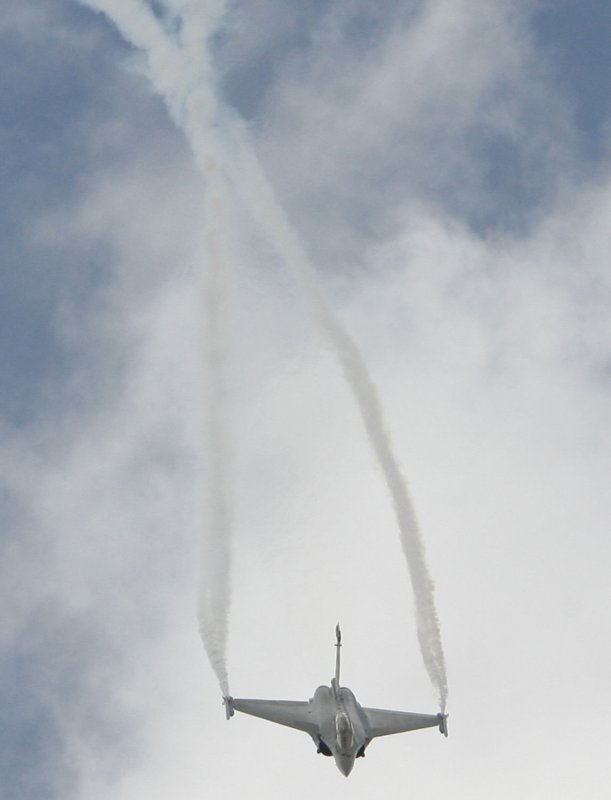The Dassault Rafale performs during a demonstration at the 47th International Paris Air Show at Le Bourget near Paris on June 21, 2007. (UPI Photo/David Silpa) |
License Photo
KUWAIT CITY, March 23 (UPI) -- Islamist lawmakers rejected a potential deal to buy up to 28 Dassault Rafale combat jets from France as "suspicious," the latest clash in a long-running dispute between the emirate's feisty parliament and the government over arms procurement.
The four-man Islamist group known as the Development and Reform Bloc in the 50-member National Assembly didn't spell out why the deal was considered problematic.
But in the past, the main objections to deals scrutinized by parliament involved alleged kickbacks to senior officials in the defense ministry or government interference.
Kuwait is ruled by the al-Sabah family, whose members dominate the government and the upper echelons of key ministries.
The legislators didn't say how many aircraft were involved in the proposed sale. But French President Nicolas Sarkozy said during a Gulf tour in February 2009 that discussions were under way for the sale of 14-28 Rafales.
The French fighter is competing for an order worth an estimated $4.4 billion for 36 jets along with Sweden's Gripen NG built by Saab AB and Boeing's F-18A.
On Nov. 3, the legislature voted unanimously to have the Audit Bureau, Kuwait's independent financial regulatory body, investigate the Rafale issue and two planned arms deals with the United States to determine whether they were in line with Kuwaiti laws.
One of the U.S. agreements is for the purchase of an unspecified number of Lockheed Martin C-130 Hercules transport aircraft, the other for an ammunition factory.
Together the three deals are reputed to worth at least $8 billion.
At that time, Islamist legislator Jamaan al-Harbash of the Development and Reform Bloc, alleged that Defense Minister Sheik Jaber al-Mubarak al-Sabah kept the assembly in the dark about the three deals and refused to answer parliamentary questions on them.
Some lawmakers alleged that the value of the potential deals was inflated, but none disclosed any figures.
Sabah, who is also deputy prime minister, has said earlier after discussion in Paris that he had given the defense ministry the green light to the Rafale deal and ordered technical teams to scrutinize the sale.
Harbash claimed that unnamed officials with "vested business interests" were trying to influence the ministry to buy the twin-engined multi-role Rafale.
He claimed in a written statement that that a ministry technical team had recommended against buying the Rafale, citing Dassault Aviation's inability to sell the fighter to anyone but the French armed forces, which have ordered 180 of the aircraft.
Dassault has been desperate to find foreign buyers but it has failed to sign up any, although the United Arab Emirates has shown interest. Much anticipated sales to Brazil and Libya have failed to materialize.
Harbash said after the November decision to call in the Audit Bureau, the defense ministry moved the head of the Kuwait military office in Paris, who favored the deal, to command of the air force, thus enhancing the Rafale's prospects.
Kuwait's parliament is the most active of the elected or partly elected legislatures in the region. Its members have repeatedly clashed with the al-Sabahs and the emir had dissolved parliament five times since 1976, twice for long periods when he ruled by decree.
Islamists hold 21 seats, the largest bloc, in the assembly. The legislature has frequently rejected major arms deals set up by the defense ministry on the grounds the weapons systems didn't measure up to the requirements of the emirate's military or because major graft was suspected.
Hefty kickbacks by foreign arms companies have long been the norm in the region.
In 1999, parliament quashed a plan to buy U.S. M109A6 Paladin self-propelled artillery built by United Defense LP for $436 million and forced the government to buy Chinese 155mm/45-cal PLZ45 guns for $186 million built to Kuwaiti specifications.
The assembly's Committee for Protecting Public Funds has repeatedly delayed major procurement programs, often sending the chamber into uproar, and has established considerable oversight powers on military spending, far more than other parliament in the Arab world.















